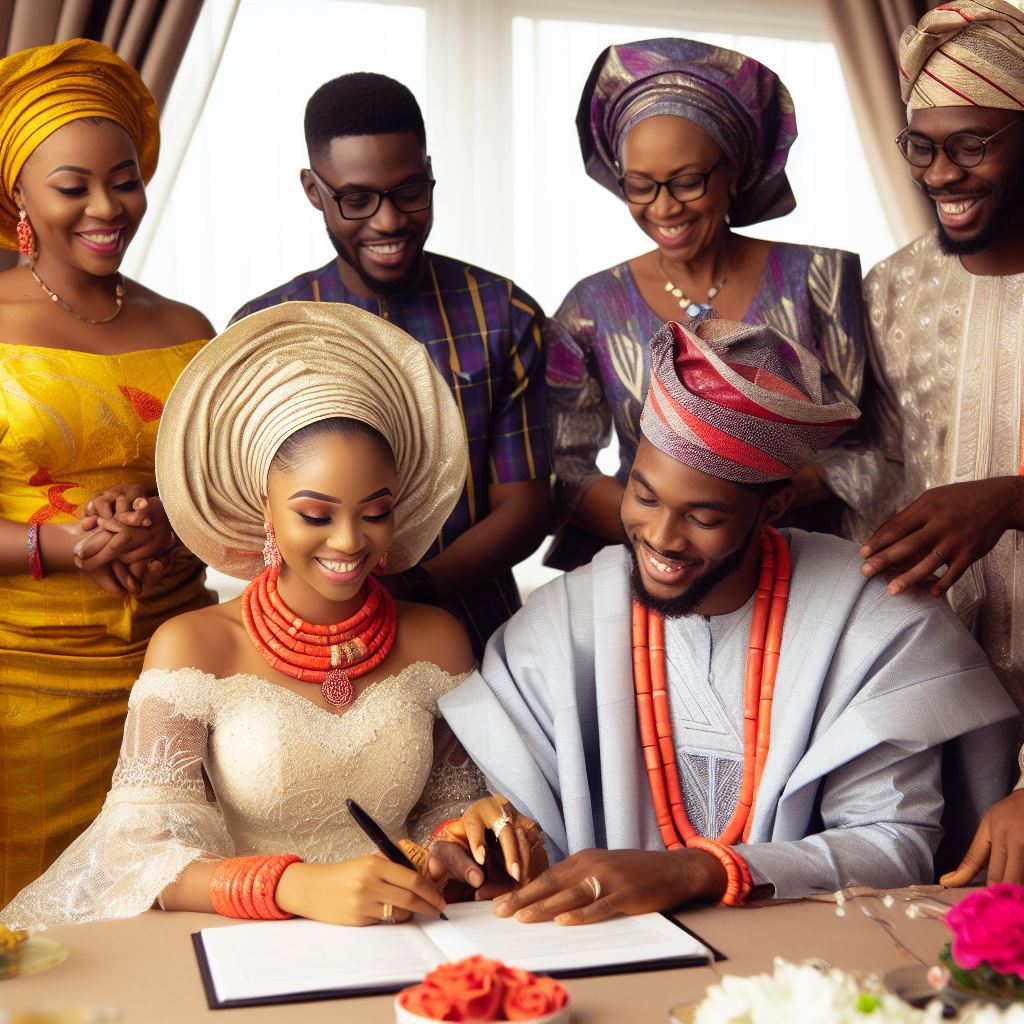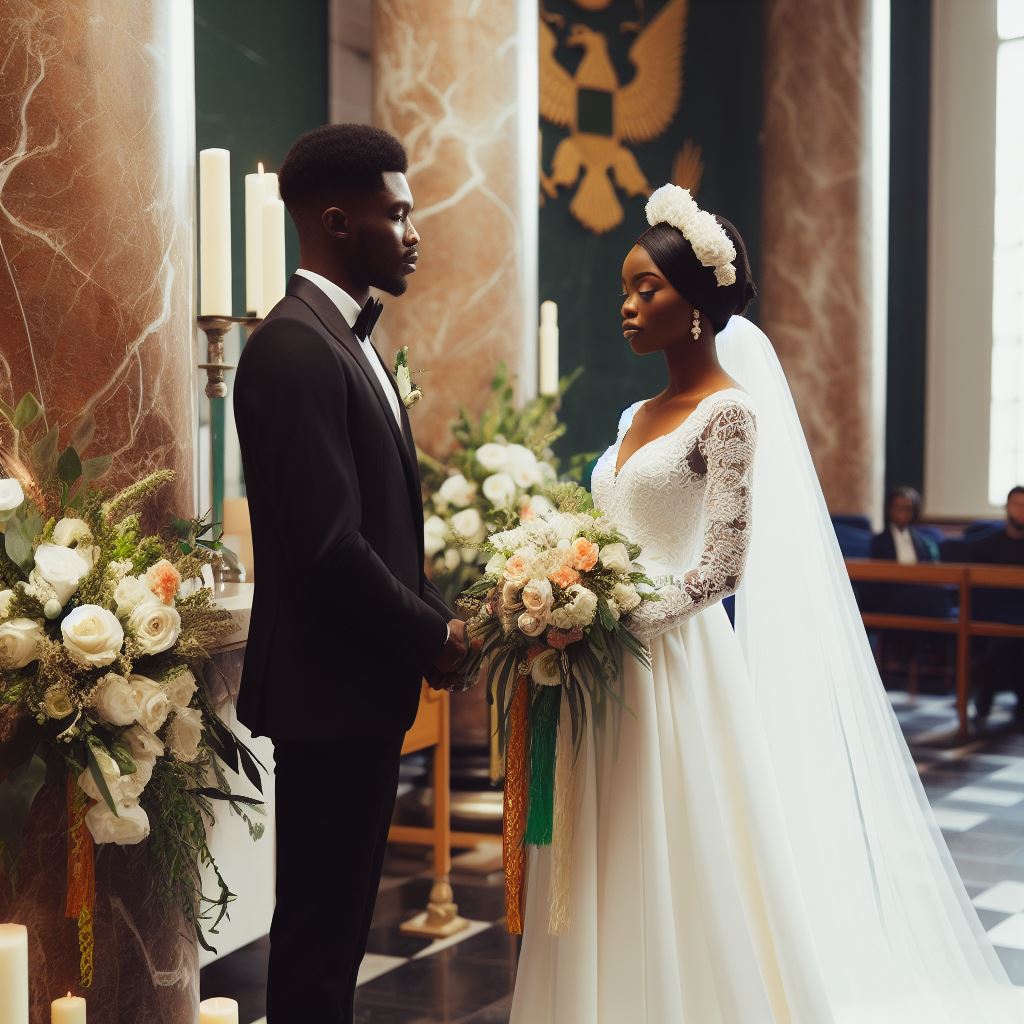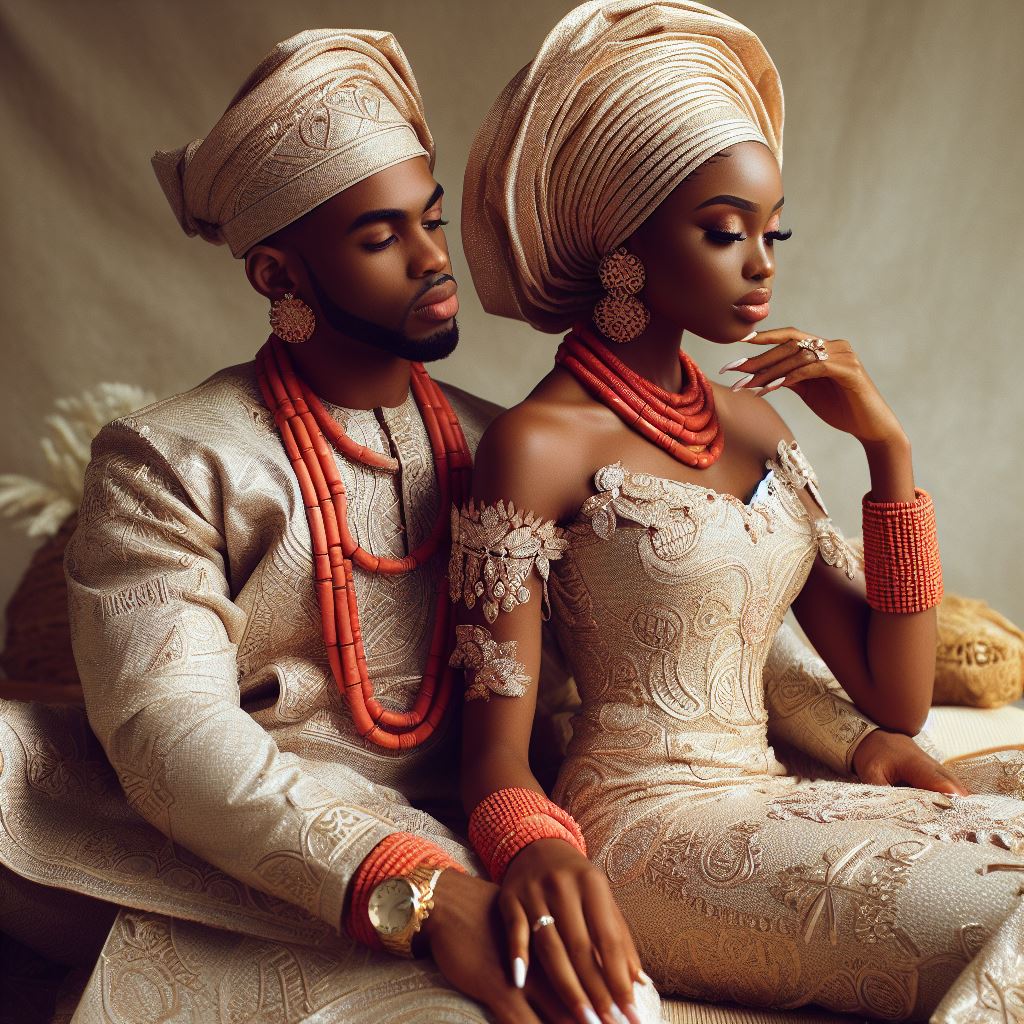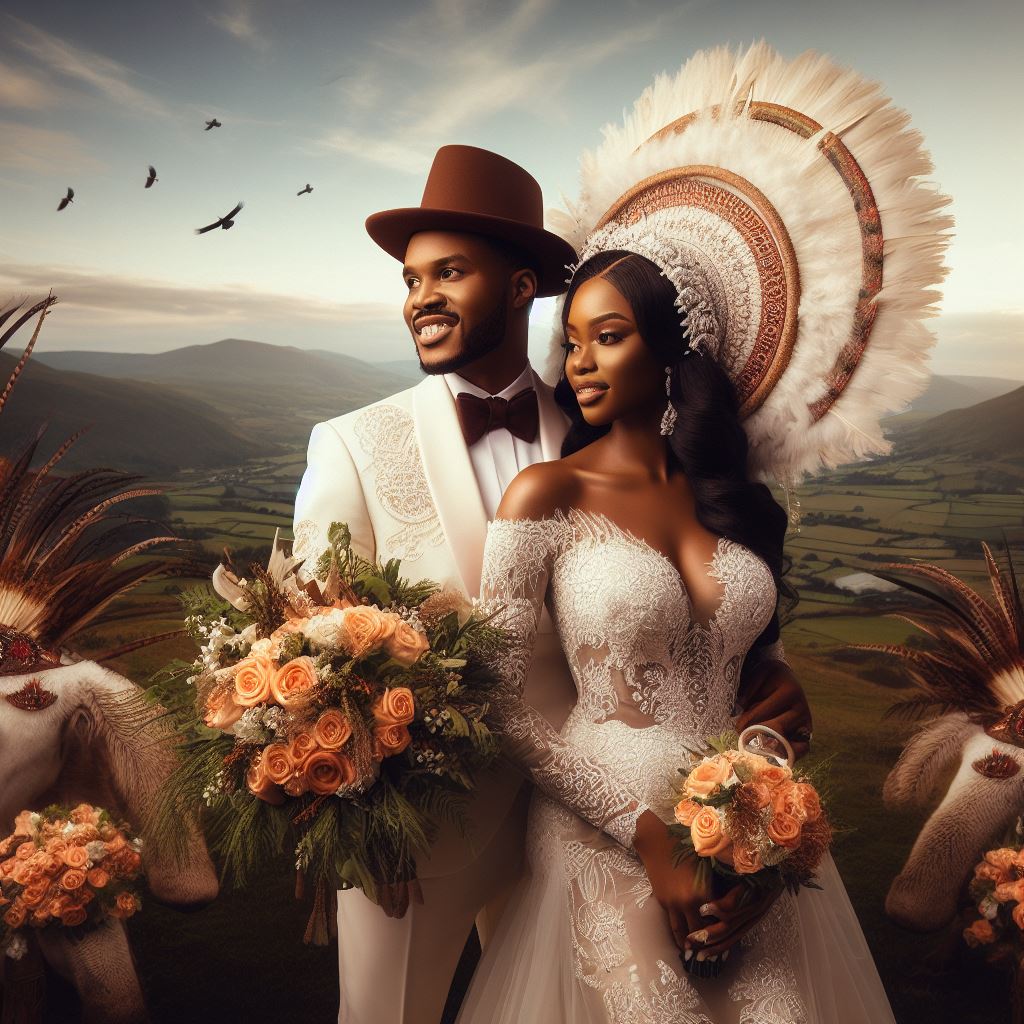Introduction
Marriage vows are an integral part of Nigerian weddings, with 84% of couples including them.
Marriage vows in Nigeria reflect cultural values and have a rich history.
This blog post explores the history, meaning, and customs of Nigerian marriage vows.
Nigerian marriage vows are deeply rooted in tradition, symbolizing love, respect, and commitment between couples.
They date back to ancient customs and have evolved over time.
These vows are recited in the presence of family, friends, and community leaders.
They serve as public declarations of a couple’s intentions and dedication to each other and their marriage.
Nigerian marriage vows vary across ethnic groups, with unique rituals and practices.
Yoruba ceremonies, for example, include prayers, blessings, and traditional rituals during vow exchanges.
Igbo vows are recited in the native language, emphasizing commitment to each other and the community.
Despite this diversity, marriage vows unify Nigerians, reminding them of fundamental values like love, trust, and loyalty.
Basically, Nigerian marriage vows are culturally significant, symbolizing commitment and tradition in weddings.
Understanding their history, meaning, and customs provides insights into the richness of Nigerian ceremonies.
Stay tuned for a deeper dive into the vows’ historical origins.
History of Marriage Vows in Nigeria
Marriage vows in Nigeria have a rich history that dates back to ancient African practices and rituals.
These vows have evolved over time due to various influences, including colonialism and the changing dynamics of Nigerian society.
Ancient African practices and rituals related to marriage vows
In ancient African cultures, marriage vows were deeply rooted in traditions and customs.
These vows were not only a commitment between the bride and groom but also between their families and ancestors.
The vows symbolized the merging of two families, ensuring unity and harmony.
Ancient African marriage vows often involved elaborate ceremonies and rituals.
These ceremonies were conducted by tribal elders or spiritual leaders who played a significant role in ensuring the success of the union.
Vows were exchanged in the presence of the community, and witnesses were required to validate the marriage.
Furthermore, marriage vows in ancient African cultures focused on the roles and responsibilities of both the husband and wife within the community.
These vows emphasized the importance of mutual respect, support, and the foundation of a strong family unit.
Influence of colonialism on contemporary marriage vows
The arrival of colonial powers in Nigeria brought significant changes to marriage vows.
Colonialism introduced Western notions of marriage and influenced the way Nigerians viewed and conducted weddings.
Traditional African marriage vows began to incorporate elements influenced by Christianity and European customs.
Under colonial rule, Christianity became more prominent in Nigeria, and many Nigerians embraced the Christian marriage ceremony.
As a result, marriage vows became more religious, with couples promising to honor their union under the eyes of God.
The influence of colonialism also led to a shift in the structure of Nigerian society, with an emphasis on nuclear families rather than extended families.
Traditional Nigerian wedding ceremonies and the role of vows
Traditional Nigerian wedding ceremonies still hold great significance and are deeply rooted in cultural practices.
These ceremonies vary depending on the ethnic group but typically involve colorful attire, dance, music, and communal feasts.
The exchange of marriage vows is a crucial part of traditional Nigerian weddings.
Vows are seen as a public declaration of commitment and love between the couple.
They serve as a reminder of the responsibilities each partner has towards their spouse, family, and community.
Traditional Nigerian marriage vows often include promises of fidelity, respect, and support.
They also reflect the values and customs of the specific ethnic group, ensuring the continuation of cultural practices throughout generations.
Evolution of marriage vows in modern Nigerian society
In modern Nigerian society, marriage vows continue to evolve and adapt to changing times.
With globalization and the influence of Western cultures, Nigerian couples now often take inspiration from both traditional Nigerian vows and contemporary Western wedding vows.
Modern marriage vows in Nigeria focus on equality and partnership.
Couples express their commitment to sharing responsibilities, supporting each other’s aspirations, and building a loving and respectful relationship.
These vows emphasize the importance of communication, trust, and growing together as a couple.
Moreover, the influence of social media and popular culture has also impacted marriage vows in Nigeria.
Some couples now use creative and personalized vows to express their love and commitment, incorporating elements of humor, poetry, or references to shared experiences.
In essence, the history of marriage vows in Nigeria reveals a journey influenced by ancient African traditions, colonialism, and the dynamics of modern society.
Despite these influences, marriage vows remain a significant part of Nigerian weddings, symbolizing commitment and the preservation of cultural heritage.
Read: Duration of Obtaining a Marriage Certificate in Nigeria: What to Expect
Meaning and Significance of Marriage Vows
Cultural and societal importance of marriage vows in Nigeria
Marriage vows hold immense cultural and societal significance in Nigeria, reflecting the country’s values and traditions.
They are considered sacred and symbolize the commitment and responsibilities of the couple towards each other, their families, and the community.
Symbolism behind specific words or phrases commonly used in marriage vows
Specific words and phrases commonly used in marriage vows hold deep symbolism.
For instance, “for better or for worse” signifies the couple’s commitment to stand by each other regardless of the circumstances.
“Till death do us part” symbolizes the eternal nature of their bond.
Promoting commitment and unity within a marriage
Marriage vows play a crucial role in promoting commitment and unity within a marriage.
By publicly declaring their promises to one another, couples reinforce their dedication and create a strong foundation for their relationship.
Vows serve as a reminder of the promises made and encourage spouses to work through challenges together.
Relationship between marriage vows and marital expectations
Marriage vows shape marital expectations by outlining responsibilities and obligations for each partner, guiding couples in creating a shared vision.
Vows serve as a symbol of love, unity, and commitment. Key phrases like “for better or for worse” signify unconditional support.
“Till death do us part” represents an unwavering commitment till life’s end.
Vows promote commitment and unity by publicly declaring promises.
They serve as constant reminders of dedication, encouraging working through challenges together.
Vows also provide clarity and guidance, ensuring both partners understand their commitments and approach conflicts with love and understanding.
In short, marriage vows hold deep meaning and cultural significance in Nigeria, guiding couples and strengthening their commitment and unity in married life.
Read: Interstate Marriages: How to Secure Your Marriage Certificate
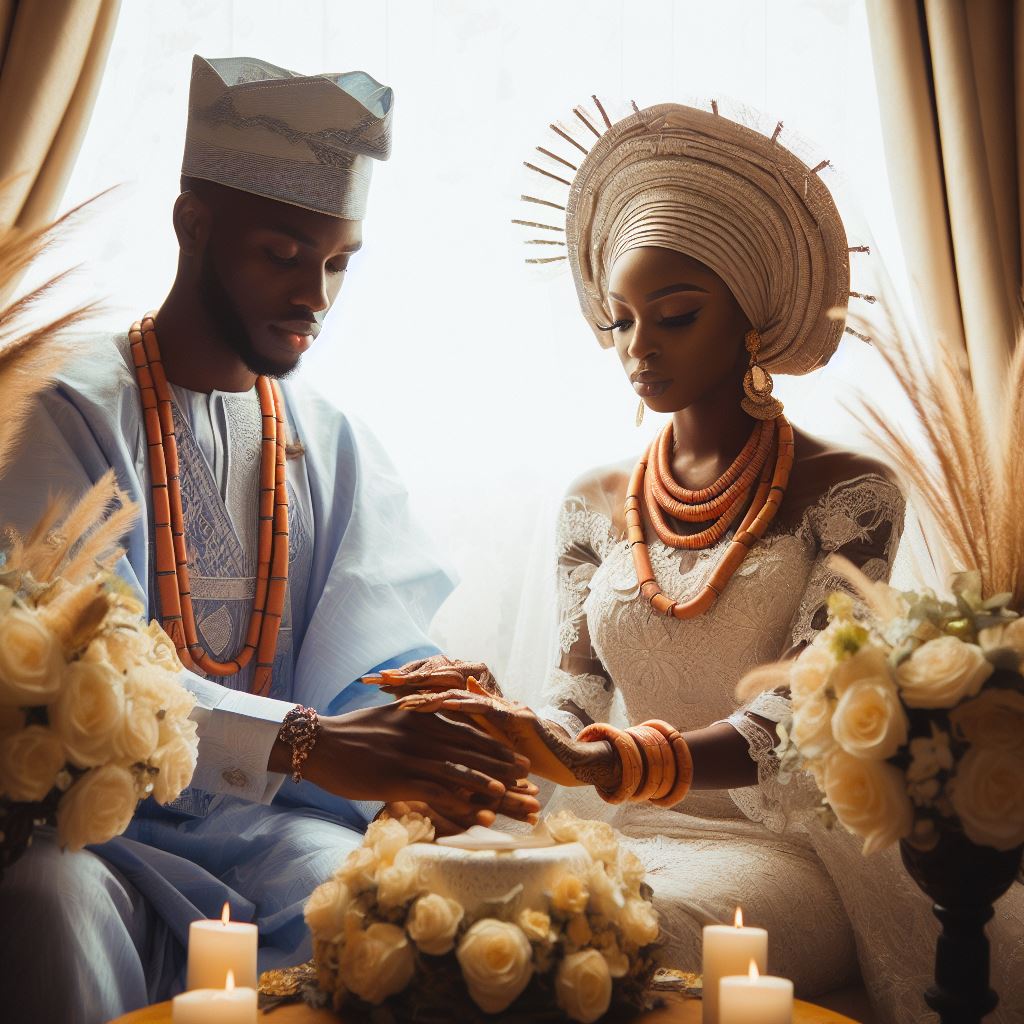
Custom and Practice of Marriage Vows in Nigeria
Marriage vows in Nigeria are deeply rooted in tradition and customs, varying across different ethnic groups.
These vows play a significant role in the creation and execution of a marriage bond, with the active involvement of family and community.
Variations in marriage vows between different Nigerian ethnic groups
Nigeria is known for its diverse cultural heritage, and this is reflected in the variations of marriage vows.
Each ethnic group has its unique customs and expressions of commitment.
For instance, the Yoruba ethnic group often recites their vows in the presence of a spiritual leader, emphasizing the importance of spirituality and divine blessings in their union.
On the other hand, the Igbo ethnic group places great emphasis on the exchange of symbolic objects such as kola nuts and palm wine during the vow exchange ceremony to signify unity and hospitality.
The Hausa-Fulani ethnic group incorporates Islamic traditions into their marriage vows.
The bride and groom declare their commitment to each other while also pledging to fulfill their religious duties.
These variations in marriage vows reflect the rich cultural tapestry of Nigeria and highlight the significance of each ethnic group’s customs and traditions.
Role of family and community in the creation and execution of marriage vows
In Nigeria, marriage is not seen as merely the union of two individuals but as the merging of two families.
As a result, the role of family and community in the creation and execution of marriage vows is crucial.
Family elders often play a significant role in guiding and overseeing the vow exchange ceremony.
They provide wisdom, blessings, and advice to the couple, ensuring that the vows are taken seriously and upheld throughout the marriage.
Community members also actively participate in the marriage ceremony, offering support and witnessing the couple’s commitment.
This communal involvement strengthens the marital bond and affirms the importance of the vows.
Rituals and customs associated with the exchange of vows during the wedding ceremony
In Nigeria, the exchange of marriage vows is accompanied by various rituals and customs that symbolize the couple’s commitment and the merging of their lives.
One common ritual is the sharing of a meal together immediately after the vows are exchanged.
This act symbolizes the couple’s willingness to nurture and provide for each other throughout their lives.
Another custom involves the pouring of libation, where spiritual prayers and blessings are offered to ancestors and deities, seeking their guidance and support for the newlywed couple.
Additionally, the use of traditional attire and the performance of cultural dances during the vow exchange ceremony further emphasizes the significance of marriage as a celebration of heritage.
Impact of modern influences on the customization of marriage vows
With the advent of modern influences, Nigerian couples have begun to personalize their marriage vows to reflect their individuality and values.
Some couples incorporate Western traditions, such as exchanging personalized vows that express their love, commitment, and future aspirations together.
Furthermore, contemporary couples often opt for smaller, more intimate ceremonies where they can focus on the quality and depth of their vows, rather than adhering strictly to traditional practices.
While modern influences have played a role in the customization of marriage vows, Nigerian couples strive to strike a balance between honoring their cultural heritage and embracing the evolving dynamics of their society.
In fact the custom and practice of marriage vows in Nigeria showcase the diversity and richness of the country’s culture.
From the variations between ethnic groups to the involvement of family and community, these vows hold deep symbolism and meaning.
The rituals and customs associated with the exchange of vows strengthen the marital bond, while modern influences allow for personalization and individual expression.
Ultimately, marriage vows in Nigeria serve as a testament to the commitment, love, and shared values of the couples who embark on this lifelong journey together.
Read: Marriage Certificate Challenges and Solutions in Nigeria
Contemporary Challenges and Changes in Marriage Vows
Shifts in societal values and their impact on traditional marriage vows
- Evolving societal values have led to a reevaluation of traditional marriage vows.
- Traditional vows may no longer align with modern values and expectations.
- Couples are now seeking more personalized vows that reflect their unique values.
- The emphasis has shifted from obedience and duty to equality and mutual respect.
The influence of Western wedding traditions on Nigerian marriage vows
- Western wedding traditions, such as exchanging rings and reciting standardized vows, have gained popularity in Nigeria.
- Nigerian couples are incorporating Western elements into their ceremonies, including vows.
- This influence has resulted in a blending of traditional Nigerian vows with Western traditions.
- Couples have the freedom to choose whether to include Western elements or stick to traditional Nigerian vows.
Adaptation of marriage vows to reflect individual beliefs and preferences
- Many couples now choose to customize their marriage vows to align with their personal beliefs.
- This allows for a more meaningful and intimate exchange of promises.
- Couples may include religious or spiritual references, or even quotes from literature or poetry.
- The focus is on creating vows that are authentic and resonate with the couple’s shared values.
The importance of communication and compromise when rewriting or altering marriage vows
- When rewriting or altering vows, open communication is vital between the partners.
- Both individuals should express their desires and expectations for the vows.
- A spirit of compromise allows for finding a balance that satisfies both partners.
- Collaboration and understanding ensure that the final vows reflect the couple’s shared vision for their marriage.
In general, contemporary challenges and changes in marriage vows have resulted from shifts in societal values, the influence of Western wedding traditions, and the desire for personalized vows.
Couples now seek to align their vows with their individual beliefs and preferences, emphasizing equality, respect, and mutual understanding.
Through effective communication and compromise, couples can create vows that truly represent their commitment and love for each other.
Read: Benefits of Upgrading Customary Marriage to Statutory in Nigeria
Conclusion
Recap of Key Points
In this blog post, we explored the rich tapestry of marriage vows in Nigeria.
We learned about the historical evolution of these vows, their deep cultural significance, and the various customs associated with them.
Marriage vows are more than words; they symbolize commitment, unity, and love between couples.
Understanding their meaning and history can enrich the marital experience.
Acknowledgment of Diversity
It’s essential to acknowledge the diversity of marriage vows in Nigeria.
With over 250 ethnic groups, each has its unique customs and traditions, adding depth and variety to marriage ceremonies.
Closing Thoughts
Understanding the history, meaning, and customs of marriage vows is vital for building a stronger marital bond.
It fosters mutual respect, appreciation, and a deeper connection between partners.
By embracing the richness of Nigeria’s marital traditions, couples can create a marriage that reflects their unique love story while honoring the heritage of their ancestors.

